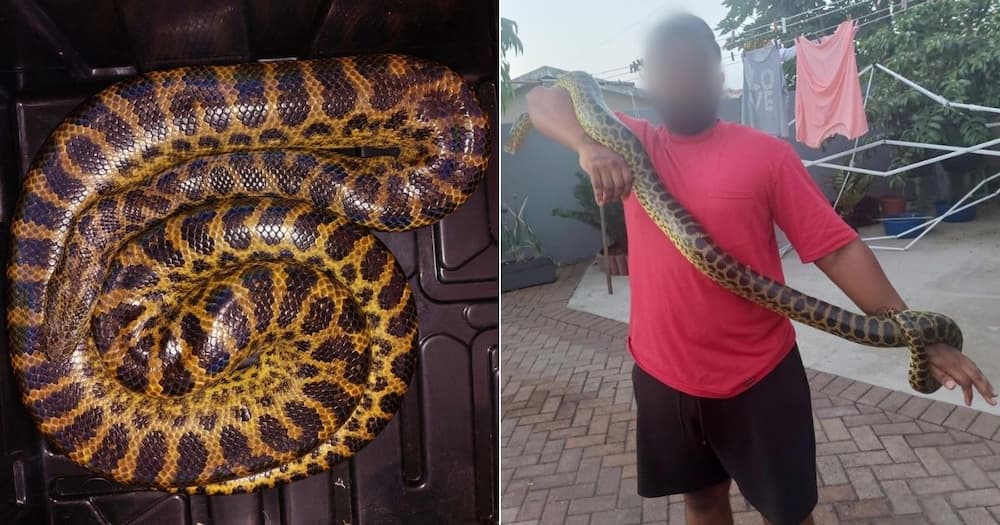Hebanna: Pet Anaconda Goes Missing in Durban, Residents Cautioned to Stay on Alert
- Residents of Phoenix have been alerted about a two-metre yellow anaconda pet snake that has escaped from its enclosure
- The report was shared by Reaction Unit South Africa on Facebook recently and said the snake is expected to grow a further four to five metres in the next few years
- Owner of the reptile Preesen Nair said the anaconda was a beloved family pet and hopes she would make a safe return
PAY ATTENTION: Follow Briefly News on Twitter and never miss the hottest topics! Find us at @brieflyza!
A two-metre yellow anaconda pet snake has escaped from its Phoenix home in Durban and nearby residents have been urged to remain cautious.

Source: Facebook
The warning was put out by Reaction Unit South Africa on Facebook alerting the public to be on the lookout for the reptile.
“The non-venomous reptile escaped from a temporary enclosure from its owner’s residence on Troy Street in Starwood, Phoenix between 18:00 yesterday and 10:00 today (Thursday, 27 January). The black and yellow female snake could easily constrict small cats and dogs. It is expected to grow a further 4 to 5 meters in the next few years,” the post reads.

Read also
Pandemonium: Black Mamba seen chilling in KZN school, snake catcher Nick Evans comes to the rescue
The yellow anaconda is one of the largest snakes in the world but smaller than its close relative, the green anaconda. Like all boas and pythons, it is non-venomous and kills its prey by constriction.
Enjoy reading our stories? Download the BRIEFLY NEWS app on Google Play now and stay up-to-date with major South African news!
Owner of the not so common pet, Preesen Nair told TimesLIVE the snake disappeared while its enclosure was being maintained. Speaking of the anaconda Nair said she was a beloved family pet and hoped whoever finds her takes good care of her or returns the reptile to him. Nair said Medusa was a yellow anaconda and was non-venomous.
Anyone who may happen to spot the anaconda, is urged to contact Reaction Unit South Africa (RUSA) on 086 1234 333.
Online users reacted to the alarming Facebook post:
Moodley Sharon said:
“This is negligence on the owner's part. This can also be a danger to small children not only cats and dogs. Authorities should request if this owner has a permit to keep such a reptile at home around people. Also read on another platform that he is an animal breeder. Authorities should check what he is actually breeding. He claims that the snake broke the lock of its cage and escaped.”
Mncedisi Zungu wrote:
“No this guy and his family must be arrested. We don't have anacondas in south Africa. Of course he bought it, just to realise it so it can eat South Africans. Anaconda will hunt each and every member of South Africa. Watch this anaconda is here to kill us all.”
Melissa Manuel joked:
“Aiyorrrr new movie Anaconda Snake in Phoenix...starring ice tube and 3 pac.”
Creepy viral video of rattlesnakes gives the internet the heebie jeebies

Read also
"Worst thing ever": Golf GTI engulfed in flames as firefighters do the most, Mzansi sympathises with owner
Briefly News previously reported on a social media user who left users creeped out after sharing a video of den of rattle snakes nestled together under what is said to be an air conditioning pipe at a property in Texas, United States.
The video was shared by Nathan and Tony (@bcsr_and_serpentarium) who have a TikTok account for a big country snake removal and big country serpentarium. The post has over 2 million views and 60 800 likes.
Rattlesnakes are a group of venomous snakes of the genera Crotalus and Sistrurus of the subfamily Crotalinae. They are common in the US.
Source: Briefly News

